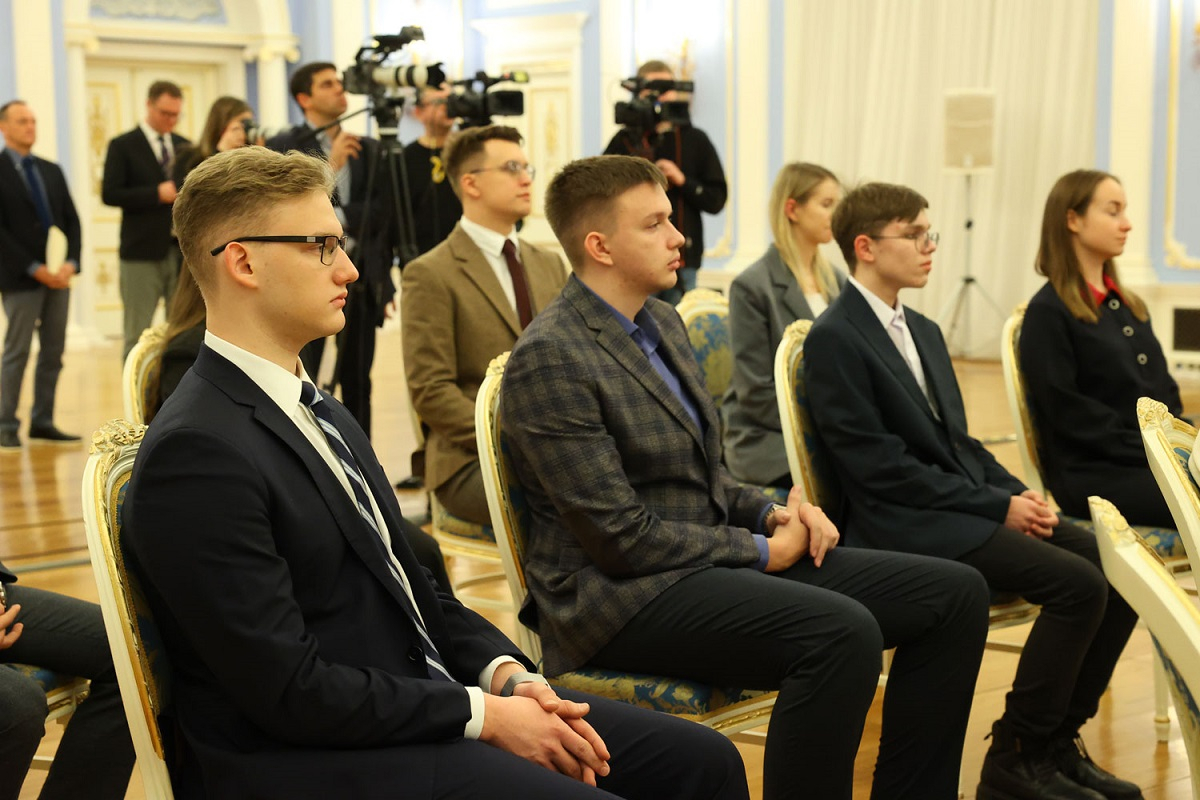Dmitry Medvedev answers questions from St Petersburg University students
Students at St Petersburg University have taken part in a meeting for schoolchildren and students with: Dmitry Medvedev, Deputy Chairperson of the Security Council of the Russian Federation, Chairperson of the Board of Trustees, and a graduate of St Petersburg University; Andrei Turchak, First Deputy Speaker of the Federation Council of the Federal Assembly of the Russian Federation; and Sergey Kravtsov, Minister of Education of the Russian Federation.
Twenty of the best schoolchildren and students in the country asked questions to Dmitry Medvedev. These students and schoolchildren are students who have only excellent marks; winners of Olympiads and contests in social sciences, history, and law; young researchers; and volunteers. ‘I will not explain what time we are living in. Our time is stormy and dramatic. Yet it is a fertile time to gain knowledge. I remember my years. Then, newspapers were very boring. They mainly contained slogans and information on socio-political issues. Yet, surprisingly, I did read them. You probably belong to the same category of young people who are interested in political life,’ said Dmitry Medvedev.
St Petersburg University was represented by Sofia Voloshchuk and Aleksandr Masyna, who are students in law. Sofia Voloshchuk is the deputy chairperson of the student scientific society at the Faculty of Law at St Petersburg University and an organiser of student international scientific conferences and round tables. Aleksandr Masyna is the chairperson of the legal committee of the Student Council at St Petersburg University.
The meeting with the Deputy Chairperson of the Security Council was set to mark the Constitution Day of the Russian Federation. It particularly focused on the role and significance of the country’s fundamental law. ‘Our entire legal system has always been built in a way to ensure that the hierarchy of normative acts is consistent with the fundamental law. It has always been, it is and it will always be. We all proceed from the fact that the Constitution is not only a document of supreme legal force, but also an act of direct action,’ said Dmitry Medvedev.
There were questions about the change in vector from Dmitry Medvedev’s scholarly and academic career to politics; ways to protect historical memory; and the specifics of teaching social sciences at school. The University students asked the Deputy Chairperson of the Security Council questions in relation to the current Russian legislation and law enforcement.
Sofia Voloshchuk asked a question about the relationship between the two postulates of the Constitution: freedom of entrepreneurial activity and Russia as a social state. In this regard, Dmitry Medvedev explained that the status of a social state means that it takes care of its citizens, but does not negate freedom of entrepreneurial activity, protection of private property, and income. The Deputy Chairperson of the Russia’s Security Council recommended Sophia to prepare a scholarly paper on this topic.
Dmitry Medvedev’s opinion, to my mind, fully reflects the current situation in Russia, when both constitutional principles create a single favourable space both for those individuals who need material support from society and the state and for entrepreneurs running their own business and pursuing economic goals.
Sofia Voloshchuk, Deputy Chairperson of the Student Scientific Society at the Faculty of Law at St Petersburg University
Aleksandr Masyna drew Dmitry Medvedev’s attention to the conflict that arises when children born abroad but will live in Russia are granted citizenship.

According to Aleksandr Masyna, such children, according to the law, cannot receive a middle name, since when born abroad there is no tradition of a "triune name", i.e. a surname, a first name, and a patronymic name. Dmitry Medvedev said that the question is ‘tricky’ and said that a patronymic is a right and a benefit. It, even if it was not given to the child at birth, should be regulated by law. ‘These are the traditional values and we must protect them,’ said Dmitry Medvedev.
At the end of the meeting, each participant was presented with gifts, one of which was the Constitution of the Russian Federation, signed by Dmitry Medvedev.



